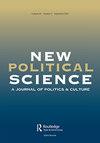The Specter of Babel: A Reconstruction of Political Judgement
IF 0.5
Q4 POLITICAL SCIENCE
引用次数: 2
Abstract
The Spectre of Babel is a remarkable achievement. Thompson presents a no-holds barred attack on the post-metaphysical turn and its various avatars across Ethics, Critical Theory, Political Philosophy, and Social Theory. Thompson details how the academy ’ s warm embrace of pragmatics, intersubjectivity, and discourse need to be seen as deeply mis-taken: such post-metaphysical approaches are unable to act as a fulcrum for political judgement and can ironically further the rise of polarized, individualistic, and acritical pub-lics. For him, by centring abstracted intersubjective practices (be it the exchange of justifi-cations, recognition, inter alia ) critical scholarship loses its anchor in the objective social world; for example, that you and I may agree on topic X does not make our understanding of X objectively correct. Thompson ruthlessly exposes this and other weaknesses of the post-metaphysical turn. But this is not just a work of critique. Rather, Thompson proposes a radical solution: a (re-)turn to a critical social ontology, a remedy he prescribes in detail. This is thus a must-read book for philosophers, sociologists, and Critical Theorists alike. The Spectre consists of an introduction and eight substantial chapters, divided into two parts: In the Courtyard of Babel: Postmetaphysics [ sic ] and the Failure of Critical Judgement , and, Beyond Babel: Social Ontology and the Reconstruction of Critical Reason . In crude summary, Part One can be read as stating, today ’ s post-metaphysical scholarship is deeply problematic for various reasons. Part Two more or less states, here is how and why a critical social ontology would make things better. The book is propelled by the fear of the titular specter, a situation where each subject holds to a self-circumscribed explanatory and justificatory framework, devoid of reference to the external world. Thompson offers his critical巴别塔的幽灵:政治审判的重建
《巴别塔的幽灵党》是一项了不起的成就。汤普森对后形而上学转向及其在伦理学、批判理论、政治哲学和社会理论中的各种化身进行了无限制的攻击。汤普森详细介绍了学院对语用学、主体间性和话语的热情拥抱是如何被视为严重错误的:这种后形而上学的方法无法作为政治判断的支点,具有讽刺意味的是,它会进一步助长两极分化、个人主义和批判性的酒吧主义。对他来说,通过集中抽象的主体间实践(无论是正当理由的交换、承认等),批判性学术失去了在客观社会世界中的锚;例如,你和我可能在主题X上达成一致,这并不能使我们对X的理解客观正确。汤普森无情地揭露了后形而上学转向的这一弱点和其他弱点。但这不仅仅是一部批判的作品。相反,汤普森提出了一个激进的解决方案:转向批判性社会本体论,这是他详细规定的补救措施。因此,这是哲学家、社会学家和批判理论家的必读之书。《幽灵党》由引言和八个实质性章节组成,分为两部分:《在巴别塔的院子里:后形而上学与批判性判断的失败》和《超越巴别塔:社会本体论与批判性理性的重建》。粗略地说,第一部分可以理解为:由于各种原因,今天的后形而上学学术存在着深刻的问题。第二部分或多或少地指出,以下是批判性社会本体论如何以及为什么会让事情变得更好。这本书是由对有名无实的幽灵的恐惧推动的,在这种情况下,每个主题都坚持一个自我限制的解释和论证框架,没有提及外部世界。汤普森提出了他的批评
本文章由计算机程序翻译,如有差异,请以英文原文为准。
求助全文
约1分钟内获得全文
求助全文

 求助内容:
求助内容: 应助结果提醒方式:
应助结果提醒方式:


